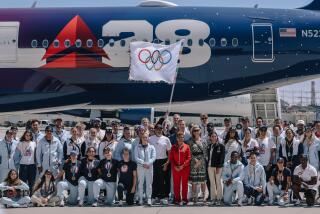Olympic Leaders Are Still Behind London
SINGAPORE — The deadly blasts that ripped through London’s transit system on Thursday came only one day after London was awarded the 2012 Summer Games, raising anew security concerns relating to the Olympics.
International Olympic Committee President Jacques Rogge, affirming support for a London 2012 Games, called the blasts “tragic” and “barbaric” and said he had written letters of condolence to British Prime Minister Tony Blair, London Mayor Ken Livingstone and Sebastian Coe, the two-time gold medalist in track and field who led London’s winning bid. “I am a very sad man,” Rogge said in an interview.
Rogge and other Olympic officials said they had received no suggestion the attacks were linked to Wednesday’s IOC vote that gave London the 2012 Games. London narrowly defeated Paris, 54-50, in the fourth round of voting; earlier rounds eliminated Moscow, New York and Madrid.
The London transit system is due to play a central role in the 2012 Olympics. A new Olympic Park to be built in the city’s east end is due to be served by 10 subway lines, including one now under construction for a high-speed shuttle linking the Olympic site with the King’s Cross station in central London.
That station is the planned hub of spectator access to the 2012 Games. The second of the four bombs that exploded Thursday tore through a Piccadilly line subway train between the King’s Cross and Russell Square stations.
In selling their 2012 plan, London officials had sought to highlight what they believed was a key security-related advantage -- the self-contained nature of Olympic Park, site of many of the major Games venues, including the Olympic village.
Also inside the Park: an 80,000-seat Olympic Stadium, a sprawling aquatics center, a cycling velodrome and four arenas for sports such as fencing, volleyball, team handball and basketball.
Other events on the Olympic program would be held at venues scattered throughout London -- beach volleyball, for instance, at Horse Guards Parade in the center of the city, and soccer at 90,000-seat Wembley Stadium, now under construction in northwest London.
Moreover, sailing would be held in Weymouth, southwest of London. And, as has become traditional in recent editions of the Games, the early rounds of the soccer tournament would be scattered around the host nation. In Britain, that means at such famous venues as Old Trafford, Manchester United’s home grounds.
“I assure you these terrorist acts in no way reduce our resolve to run excellent Olympic Games in 2012,” Craig Reedie, the chairman of the British Olympic Assn., told IOC delegates as the IOC session resumed in open session early today. IOC business today also included a moment of silence for Thursday’s casualties.
Rogge, in an interview Thursday night, said, “There is no oasis in this world and every city faces risk. There is no safe haven. No one can say, ‘My city is safe. My country is safe.’ ”
Security has been what Rogge often calls “priority No. 1” at the Games since the 1972 Munich Olympics, where Palestinian terrorists kidnapped and murdered 11 Israeli athletes and coaches.
Last year’s Athens Games marked the first Summer Olympics since the Sept. 11, 2001, terror attacks on New York and Washington. The Greek government spent nearly $1.5 billion in security preparations for the 2004 Games; the 2004 Olympics went off without a significant security hitch.
Reports of the blast cut short the celebration here among London 2012 boosters. Government and bid officials canceled departure and arrival celebrations at Singapore and London airports, the government minister who oversaw the London bid, Tessa Jowell, condemning what she called “this appalling tragedy.”
Keith Mills, the bid’s chief executive, said he and other London 2012 officials and boosters were “devastated, completely and absolutely devastated.”
More to Read
Go beyond the scoreboard
Get the latest on L.A.'s teams in the daily Sports Report newsletter.
You may occasionally receive promotional content from the Los Angeles Times.






